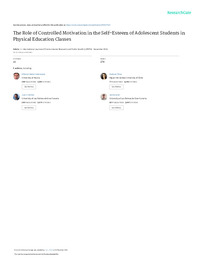Título :
The role of controlled motivation in the self-esteem of adolescent students in physical education classes |
Autor :
Valero-Valenzuela, Alfonso
Huéscar Hernández, Elisa
Núñez, Juan L.
León, Jaime
Conte, Luis
Moreno-Murcia, Juan Antonio |
Editor :
MDPI |
Departamento:
Departamentos de la UMH::Psicología de la Salud |
Fecha de publicación:
2021-11 |
URI :
https://hdl.handle.net/11000/38441 |
Resumen :
The aim of this cross-sectional study was to analyse the relationships between the satisfaction
of psychological basic needs, physical education, academic controlling motivation, and selfesteem,
and to propose a prediction model in line with the postulates from the hierarchical model
found in the self-determination theory. The participants were 618 physical education students from
primary and secondary school (317 girls and 301 boys) aged between 10 and 14 years old (M = 11.62;
SD = 0.94). The questionnaires basic psychological needs in exercise measurement scale (BPNES),
perceived locus of causality scale (PLOC), the academic motivation scale (EME), and physical selfperception
profile (PSPP) were used to measure the studied variables. The results showed that autonomy
and relatedness significantly and negatively predicted physical education controlling motivation,
which predicted a positive and significant academic controlling motivation. This, in turn,
negatively and significantly predicted self-esteem. It is concluded that it is essential to avoid controlling
motivation to promote the development of a positive self-perception in students.
|
Palabras clave/Materias:
School
Teaching
Behaviours
Competence
Autonomy
Relatedness
Psychological needs |
Tipo de documento :
info:eu-repo/semantics/article |
Derechos de acceso:
info:eu-repo/semantics/openAccess
Attribution-NonCommercial-NoDerivatives 4.0 Internacional |
DOI :
https://doi.org/10.3390/ ijerph182111602 |
Publicado en:
International Journal of Environmental Research and Public Health, Vol. 18, Nº 21 (2021) |
Aparece en las colecciones:
Artículos- Psicología de la Salud
|
 La licencia se describe como: Atribución-NonComercial-NoDerivada 4.0 Internacional.
La licencia se describe como: Atribución-NonComercial-NoDerivada 4.0 Internacional.
.png)
